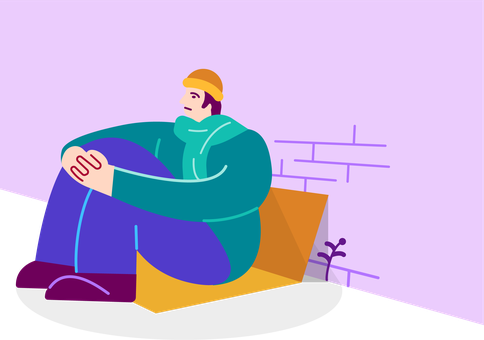In periods of severe cold weather increased attention rightly turns to the wellbeing of people sleeping rough. There are countless stories in the media, online campaigns and all sorts of information on how to help people sleeping on the streets during these difficult times.
But there isn’t the same type of awareness of the impact of hot weather. For people sleeping on the streets, it can be a challenge to find drinking water, cool showers and cool spaces to spend time in. Additionally, without safe storage, people are often wearing extra layers or carrying heavy bags all day. These factors combine to put people at risk of sunburn, dehydration and, in some cases, heat stroke. Many people who sleep rough also have underlying health conditions which can be exacerbated by hot weather, while people’s mental health can also often worsen in the heat and using drugs or alcohol in hot conditions can put people at even greater risk.
The impact of the coronavirus restrictions may also pose new problems. People are likely to be spending more time indoors in small, hot rooms. When outside, access to drinking water and air-conditioned public buildings has been restricted, while day centres can’t welcome as many people indoors during the heat of the day. Social distancing and hygiene measures might also be compromised if people share bottles of water or gather together to stay in the shade.
It’s clear from StreetLink’s own data that members of the public are concerned about the wellbeing of people sleeping rough during periods of high temperature. Alerts increased by around a quarter during the recent periods of hot weather.
That’s why it’s so important members of the public know how to help if they are concerned about someone sleeping rough in the heat. While the English summer is notoriously unpredictable there are likely to be more mini-heatwaves like we witnessed in June over the next few months. If you see someone sleeping rough during this time here are some simple things you can do:
- Smile. Stop and say hello and ask how the person is doing.
- Check if the person is happy to accept items such as water and sun cream to help keep them hydrated and protected from the sun. Umbrellas can also help people stay in the shade during particularly hot periods.
- Ask a nearby café if they will let you ‘pay it forward’, so the person in question can pick up cold drinks and food when needed.
- Make an alert via StreetLink. The alert will be passed to a local outreach service who will visit the person in question, aiming to connect them with local support services.
Looking beyond the pandemic
As we start to see the impact of so many people being vaccinated, there is a glimmer of hope that life will return to some degree of normality in the near future. Over the past 15 months, the huge success of the ‘Everyone In’ programme demonstrated how effective universal, unconditional support is in tackling homelessness, with official figures show that rough sleeping fell by 37% between 2019 and 2020.
Now the homelessness sector is concentrating on building on this success through advocating for, and implementing, long-term solutions that can end homelessness for good.
How you can help
“I volunteer with Streetlink to connect rough sleepers with the help that they need. Streetlink staff are really friendly, provide great training, and are always happy to support. If anyone has been helped to leave the streets after an alert I put through then that’s my job done!” - James, StreetLink volunteer
StreetLink is staffed by a small team of seven, so it relies on the support of volunteers to help process phone and web referrals. Volunteers receive core training as well as reimbursed volunteering expenses. If you are interested in helping provide a vital service in the work to end homelessness then you can apply via the charity St Mungo’s website.
